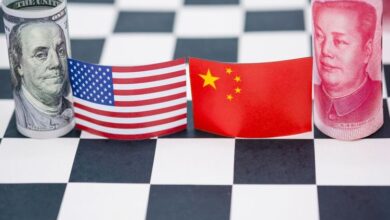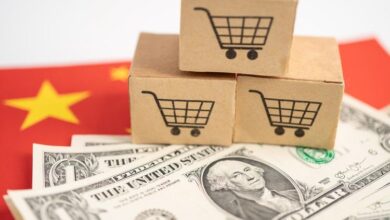Biden’s New Tariffs On Chinese Goods: Impact On Electric Vehicles

$0175.HK
Geely Automobile Holdings Limited (0175.HK), a prominent player in the automotive industry, has recently garnered significant attention in the financial markets. Known for its innovative approach and strategic acquisitions, Geely has been expanding its footprint both domestically and internationally. President Joe Biden’s recent announcement of new tariffs on Chinese goods has generated significant attention, particularly regarding the electric vehicle (EV) sector. The new duties on EVs from companies like BYD, Geely and NIO are set to increase dramatically, from 25% to 100% of the vehicle’s cost starting in 2024. This move is part of a broader strategy by the White House to bolster American manufacturing and reduce reliance on Chinese imports. The tariffs will affect $18 billion worth of Chinese imports, including steel, semiconductors and medical products. However, the focus on EVs and the manufacturing sector stands out as a key element of this policy shift.
Currently, the impact on the American consumer is expected to be minimal, as few Chinese-made EVs are sold in the US Only brands like Buick, Lincoln, Lotus, Polestar and Volvo import vehicles from China, with Polestar being the sole brand importing Chinese-made EVs. According to AutoForecast Solutions, the percentage of Chinese-made EVs sold in the US is just over 2% of all EV sales. This limited market presence suggests that the new tariffs may not significantly disrupt the US auto market. Nonetheless, the tariffs are seen as a strategic move by the Biden administration to protect and promote American EV manufacturing. The auto industry’s main lobbying arm, the Alliance for Automotive Innovation (AAI), has expressed support for the new tariffs.
John Bozzella, President and CEO of AAI, highlighted China’s overcapacity problem in the EV sector, noting that the country is producing more EVs than its domestic market can absorb. This has led Chinese manufacturers to seek international markets to offload their surplus vehicles. The new tariffs aim to prevent the US from becoming a dumping ground for these subsidized Chinese EVs. The United Auto Workers (UAW) has also endorsed the tariffs, describing them as a decisive step in the right direction. With support from industry groups, there are concerns about the broader implications of these tariffs.
Free trade experts warn that excluding Chinese EVs and batteries from the US market could lead to higher prices and slower adoption of climate-friendly technologies. The tariffs may also prompt Chinese manufacturers to explore alternative production locations outside China, such as Mexico or South Korea, to circumvent the new duties. For instance, BYD plans to debut a new plug-in hybrid EV pickup assembled in Mexico later this week. This strategy could potentially mitigate the impact of the tariffs on Chinese EV manufacturers. In addition to EVs, the new tariffs will also affect other sectors, including solar equipment and medical supplies.
The US has imposed tariffs on Chinese solar panels for over a decade and the new duties will further restrict imports. China currently dominates global solar panel manufacturing, with over 80% of production taking place in the country. The cost of manufacturing solar panels in China is significantly lower than in the US, making Chinese panels more competitive. However, the new tariffs could disrupt this supply chain and lead to higher prices for solar products in the US Medical supplies, including syringes and personal protective equipment, will also face additional tariffs. China exported $30.9 billion worth of medical goods to the US in recent times, accounting for about one-fifth of China’s overall medical exports.
The Biden administration’s broader strategy aims to protect the US against supply shortages experienced during the pandemic. The American Medical Manufacturers Association has called for the revocation of certain tariff exclusions, arguing that American manufacturers need a level playing field to compete with imports. President Biden’s new tariffs on Chinese goods represent a significant shift in US trade policy, particularly concerning the EV sector. While the immediate impact on American consumers may be limited, the long-term effects could include higher prices and slower adoption of green technologies. The tariffs have garnered support from industry groups but also raised concerns about potential disruptions to global supply chains. The situation evolves, the full implications of these tariffs on the US economy and international trade relations remain to be seen.
**DISCLAIMER: THIS CONTENT IS FOR INFORMATIONAL PURPOSES ONLY AND SHOULD NOT BE INTERPRETED AS INVESTMENT ADVICE. INVESTING INVOLVES RISK, INCLUDING THE POTENTIAL LOSS OF PRINCIPAL. READERS ARE ENCOURAGED TO CONDUCT THEIR OWN RESEARCH AND CONSULT WITH A QUALIFIED FINANCIAL ADVISOR BEFORE MAKING ANY INVESTMENT DECISIONS.**



